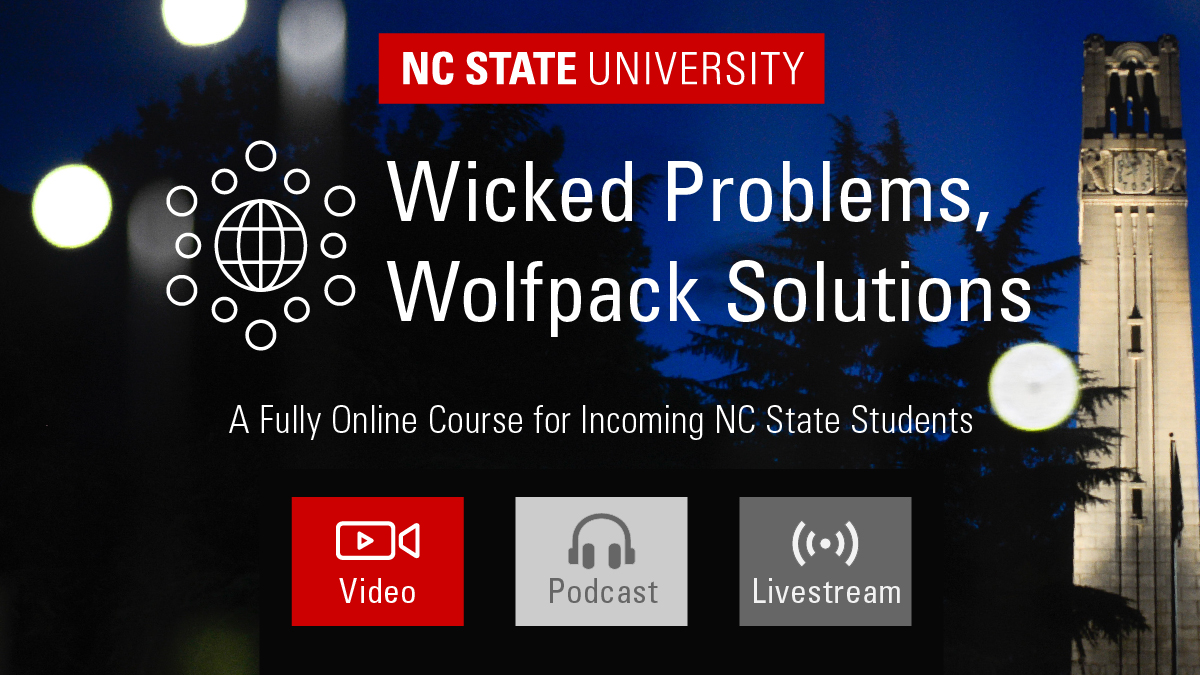Wicked Problems, Wolfpack Solutions Returns With The Future of Food

This year’s iteration of Wicked Problems, Wolfpack Solutions (WPWS) will be kicking off on June 27 for incoming first-year students and transfer students. Focused around the Future of Food, instruction will be led by Associate Teaching Professors Melissa Ramirez and Jason Flores.
According to Lead Instructional Media Designer Todd Buker, at DELTA, WPWS is the largest course by enrollment offered by NC State, with upward of 6,000 students automatically enrolled.
“WPWS is a course that examines multidisciplinary approaches to solving complex, global problems,” Buker said. “It’s free to all incoming students to NC State and is being archived for public access.” In addition, students who complete the course earn two free college credits.
Senior Instructional Designer Cathi Dunnagan has been working on this course since its inception in 2020.
“Each year, we include as many colleges at NC State as possible as we cover new content. And the students explore disciplines that may be new to them and learn how to solve wicked problems by applying critical and creative thinking. Learning that it takes many experts, many points of view, and many lenses to describe each wicked problem and to search for solutions, together. That in essence is Wicked Problems, Wolfpack Solutions,” said Dunnagan.
This year’s wicked problem is, in a word, food. From production to processing challenges, inequality to sustainability, food presents plenty of complex and interwoven problems which contribute to a worldwide issue.
“Although on the surface it might not seem like a problem to some people, the reality is that many people around the world in this country — and even on our campus — do not get enough food or nutrition,” Buker said.
By the end of the five-week online course, students will have a better understanding of the complexity of these food-related wicked problems — specifically, those relating to food distribution, supply chain issues, genetically modified food and more. Not only that, but participants will be able to acknowledge that intersectional issues cannot be solved by one person, discipline, group or government.
Furthermore, students, faculty, staff and their families can take advantage of additional resources and upcoming events from NC State’s University Libraries.
“Hopefully students will see that, despite the severe issues we face, humanity can solve these problems with careful study, intentional thinking and listening to others,” Buker said.
Even though this is the third year that NC State has offered WPWS, the instructors and development team at DELTA strive to improve the course’s accessibility and inclusivity for students.
“We continue to refine our approach to course design, facilitation, production and communications, making incremental improvements each year,” DELTA Director of Project Management Merranie Zellweger said. “While the topic changes each year, the course goals — to introduce students to multidisciplinary studies, the NC State community and academic technologies — do not.”
Senior Communications Lead Sherry Stallings played an integral role in coordinating the launch of the website with Associate Director of Web Development and User Experience Clément Bordas. In addition, Stallings’ team worked together to create and direct content for social media platforms. They also opened an Instagram account for this year’s course.
Not only an introduction to college learning and NC State’s academic technology, WPWS allows students to become exposed to a variety of ideas and problem-solving approaches before they step foot into a classroom. This way, participants have the opportunity to discover a field of study or an area of research they want to pursue, even if they had never considered it before.
“We are three years into this course,” Buker said. “Every year, I am amazed by the depth of knowledge and talent among the faculty we have here. I have learned so much from these folks.”
The Future of Food will provide the same invaluable information and skills incoming students have been taking advantage of since the course’s conception in 2020.
According to one student: “Before I started this course, I always wondered how a GEP [general education program] education can help me in computer science. However, after finishing this course, I can see how important a GEP education is.”
From start to finish, countless members of DELTA’s staff have been involved with this year’s iteration of WPWS. Planning, production, project management, communications, instructional design and technology, graphics and more are crucial components of making WPWS a success, and DELTA is at the forefront of that effort.
Related Stories:
DELTA’s portfolio regarding WPWS
Wicked Problems, Wolfpack Solutions Returns With The Future of Food
Dunnagan Reflects on Her Impact and Passion for Wicked Problems, Wolfpack Solutions
- Categories:


